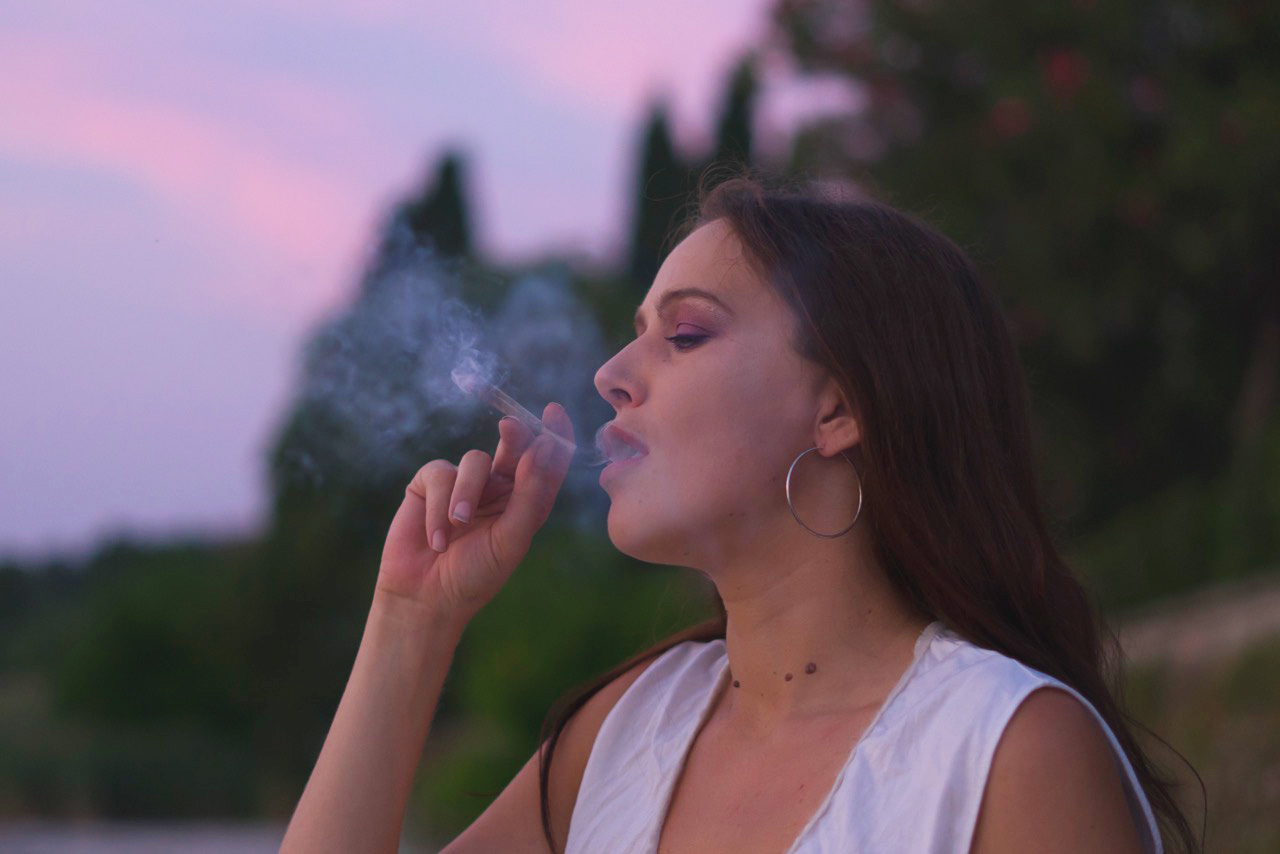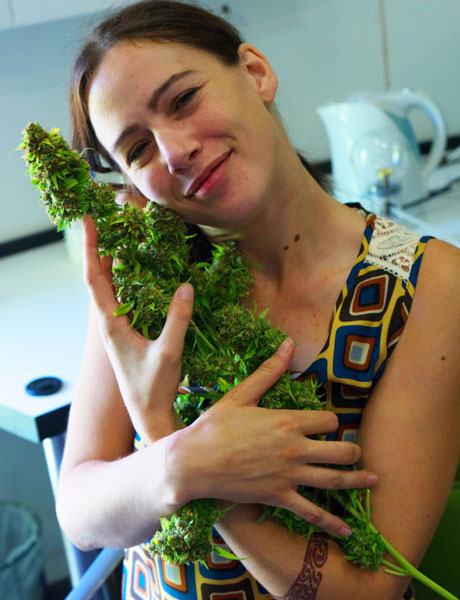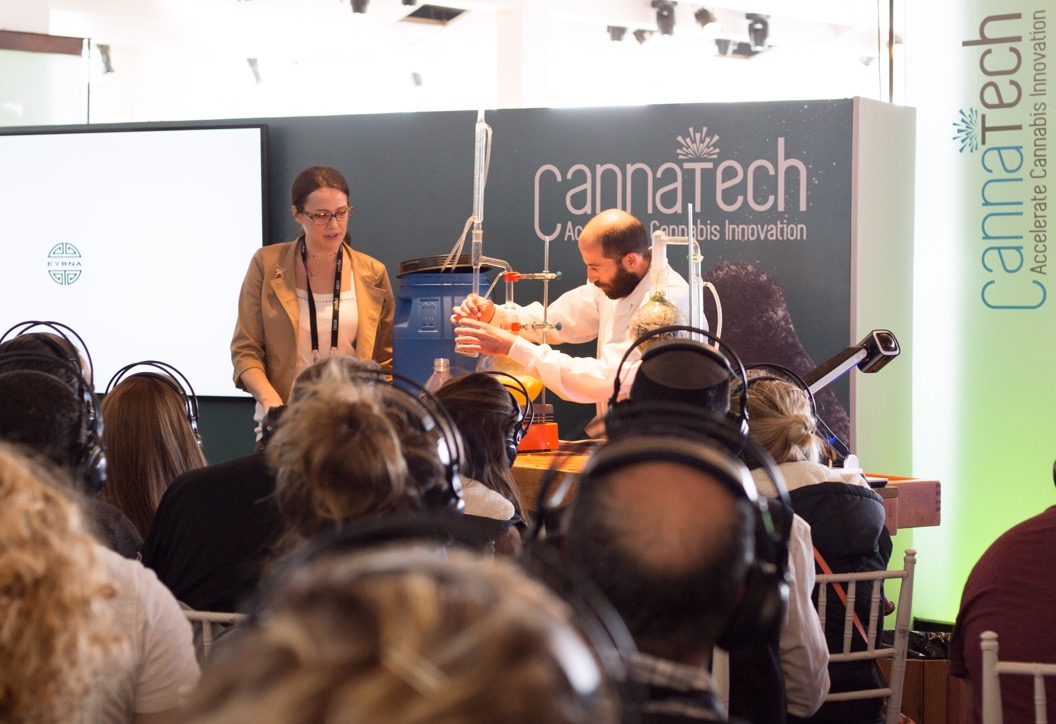20 Jun Interview with Seshata Sensi – Cannabis Journalist, Consultant & Photographer

simLeaf had the great pleasure to sit down for an interview with Seshata Sensi. Seshata is a powerhouse in the cannabis industry and regularly works as the content manager for International Highlife, travel writer for DOPE! Magazine, and contributing editor for Sensi Seeds. Beyond that she is developing a documentary series, “Planet Cannabis” – an in-depth exploration of the unique relationship that the cannabis plant has formed with the human species, and how humans have helped to spread the cannabis plant throughout the world over thousands of years.
How did you first get started in the Cannabis business?
I became a user of cannabis when I was a teenager, and by the time I was twenty I was such an enthusiast that moving to Amsterdam felt like the only option! So I did that – I worked in a few different coffeeshops including the Greenhouse, Hunter’s and Abraxas, and then started volunteering at the Cannabis College a couple of years later. A couple of years after that, I was invited to write for the magazine Soft Secrets, and since then I’ve worked with various publications including Dope Magazine and International Highlife.
The Cannabis Industry seems like a very open and welcoming environment but as with any Industry it is still a business. What have your challenges been in breaking in and getting your voice heard?
In the first few years of writing about cannabis, it was very hard to make a living. The cannabis industry is remarkably competitive despite its apparent openness, and it’s certainly all about who you know – so the main challenges continue to be all about making and maintaining good relationships with other people in the industry. However, through dedication, good networking, and racking up a huge word count, I’ve managed to get myself in a position where my work is respected and quite highly sought-after!
You have travelled extensively throughout your career. Which place has the most unique history in its relationship with cannabis? and Why?
I’d have to say that India has the richest and perhaps most fascinating history of cannabis use, at least of the countries I’ve visited. The diversity of rituals and legends surrounding its use is incredible, and its history of cannabis use in medicine may go back longer than any other – except perhaps China, which is certainly high on my list to visit.
Which country has the best cannabis culture scene?
Spain, the Netherlands, even Israel all have very laid-back smoking scenes, and as long as you respect certain rules, you’re very unlikely to get into trouble for it. But out of all the countries I’ve visited, it’s probably Morocco that has the most interesting scene overall – at least in the Rif where the hashish is mostly produced. You can find it everywhere, people smoke openly in public squares and markets, and there’s a generally very relaxed attitude towards it – although you obviously still have to be careful not to attract the attention of the police.
Which government has the best relationship with the cannabis industry?
Hard to say. It seems that there are very few national governments that are fully supportive of the cannabis industry, even in European countries like the Netherlands and Spain. In fact, it seems to be Latin American governments that are currently proving most progressive in that respect, for example Uruguay, Colombia, Argentina and Chile. But in every country, there is a great deal of nuance and complexity surrounding the issue of cannabis, so it’s not a question that can be answered simply.
You mention in your bio that your primary focus is on International trade in the Cannabis industry, “both legal and illegal”. There is a recent report in the Guardian that most of the U.K. black market cannabis use slave laborers from southeast Asia. What’s your thought on this? Do you think the Guardian’s depiction is accurate?
I have contacts in London and elsewhere in the UK who have reported situations in which Asian “gangs” bring over workers who are kept in severe poverty and with limitations to their freedom. I can’t personally say that I’ve seen the practice occurring, but I believe the Guardian’s depiction is likely to be accurate. In the UK, the price of cannabis at retail level is very high, and the potential for huge profits have led to this business model developing. A legal, regulated cannabis industry would go a long way towards solving this problem, but the UK’s approach remains regressive in that respect.
The current state of legalization efforts in the USA is both inspiring and frustrating. Do you feel optimistic about where we are headed in the next 2 to 3 years?
Given the present political situation in the US, it seems unwise to make any predictions at this stage! I personally feel that the positives of a legal cannabis industry are now so obvious that it would be economic and political suicide for any politician to attempt to disrupt it – but that doesn’t seem to stop many of them from doing exactly that. I feel the best approach is just to keep pushing forward on all fronts – regional, national and international. Ultimately, it’s when those international treaties get revised that we’ll really start to see the shape of true legality throughout the world.
There is movement in the USA for people to learn to grow their own Cannabis with many states allowing a small number of plants for personal use. That is important to us at simLeaf as we want to help educate people who may be reluctant to start. Is the International community also interested in growing? Is there a stigma or negative sentiment to those that grow their own Cannabis?
It’s incredibly important to the international cannabis community that individuals be given the right to grow small numbers of cannabis plants for personal use, either medicinal or recreational. In many countries, new laws ostensibly claiming to make medicinal cannabis legal and available continue to deprive individuals of the right to grow, and it’s a serious point of concern for the global activist community. All too often, governments and the media portray cannabis use as problem drug use, and to deny the right to personally cultivate on those grounds.
Planet Cannabis is the culmination of almost a decade of research into cannabis use and culture around the world. I’ve studied the history and traditions behind this remarkable plant in almost every country on Earth – and now it’s time to tell the story.
Seshata Sensi

As far as your personal project, we read that you are developing a documentary series titled, “Planet Cannabis”. Can you tell us a little about it?
Planet Cannabis is the culmination of almost a decade of research into cannabis use and culture around the world. I’ve studied the history and traditions behind this remarkable plant in almost every country on Earth – and now it’s time to tell the story. When and where did humans first encounter cannabis, and why did they take it around the world with them, everywhere they went? What did they use it for, and how fundamental was it to their various local cultures? These are the main questions that we’ll be answering.
We’ll also tell the story of how cannabis has adapted itself to new environments and diversified into the incredibly complex genus we know today, with its seemingly infinite array of uses.
For Season 1, which will focus on Asia, we plan to follow the route of cannabis as it spread from its evolutionary heartland in the region of Kazakhstan, through Afghanistan, India, Nepal, Thailand, and Sri Lanka – telling the story of the rich, diverse traditions that sprang up around its use along the way.
Is this your first film? What are the challenges in taking on a project like this?
It is my first film, and it’s still very much in the planning stages right now. I intend to start filming some initial scenes in early 2018 – until then, there’s a huge amount of work to be done on obtaining permissions and permits, planning the route, lining up interviews, consultants and so on, and finalizing the script outlines we hope to follow. We will also need to seek outside funding if we wish to realize the project to its full potential (which I believe will be world-class), so we need to tighten up our business plan and start hitting up industry events through the course of this year!
Where can readers find out more about Planet Cannabis?
The website planet-cannabis.com is still in development, but you can sign up to the email list to be kept informed of our progress. You can also take a look at the Planet Cannabis Facebook page (although not much is going on yet there!), or get in touch with me via my Seshata Sensi page if you have specific questions. Over the next month or so, we’ll be properly launching on Facebook and Instagram, so keep your eyes open! In the latter half of the year, we also hope to have booths at various cannabis events in Europe, the US and beyond.
Going forward, we’re also hoping to collaborate with photographers and filmmakers from all over the world to showcase and promote their work. As Planet Cannabis, we’re trying to build up a true, complete picture of cannabis around the world – and it’s unlikely that budget will ever allow us to visit every single country, so we need the cannabis community to get involved! In future, people that wish to make a significant contribution in terms of time, funding or any other resource could have some great opportunities to get involved long-term.

Well, a fellow researcher and I are currently planning a research trip to Kazakhstan to visit the largest wild weed fields in the world! We hope to conduct genetic testing – to potentially find out all kinds of interesting information about the diversity of cannabis in the region. Researchers think this area is where cannabis first evolved, and it’s a place that already has a unique importance for me – despite not yet visiting, I’ve been immersed in researching it for several months and I’m starting to feel real affinity for the place. While we conduct this research, I will also be conducting various fact-finding missions that hopefully will aid me in developing the first episode of Planet Cannabis.
As well as this, talks are ongoing about the possibility of setting up an international NGO to protect the rights of cannabis farmers throughout the world, particularly in traditional producer countries. This Kazakhstan trip could also present an opportunity to discuss this in a lot more detail, and could be the start of a project that could change the world for the better!
Thanks so much for taking the time for the interview with simLeaf. We are really looking forward to “Planet Cannabis” and whatever you have going on next!
To learn more about what Seshata Sensi is up to please check out her website at seshatasensi.com and follow her on social media.

